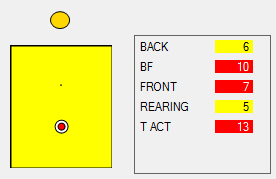

We evaluated in this work whether it is possible to prevent R toxicity by D during short-term herbicide absorption, as if the animal were exposed to an agricultural spray. This was subsequently confirmed at a transcriptomic level. We have previously demonstrated that very low levels of Roundup (0.1 ppb in tap water) exert endocrine-disrupting effects, such as sex hormone imbalances and hepatorenal toxicities, in mature rats after chronic exposure. We know that these types of xenobiotics, which include corrosive adjuvants used as co-formulants, have a main endpoint in the liver, which is the major detoxification organ. Glyphosate itself measured as a marker is one of the major surface water pollutants and food contaminants in genetically modified plants, such as in Roundup tolerant soya, and is commonly found in human urine. They are mixtures of glyphosate salts and co-formulants the latter have been characterized as more toxic than glyphosate alone in various preparations and models. Glyphosate-based pesticides, including all R formulations, are the most widely used non-selective herbicides. We exposed young male 60 day-old adults to 0.5 % R, corresponding to half of the recommended agricultural dilution, comparable to an herbicidal spray. The choice of this strain is in agreement with the U.S. In this study, we measured hepatic parameters, including various cytochrome P450 enzymes, blood parameters, and locomotor activities in the adult Sprague–Dawley rat after R and/or D treatments. Arctium lappa is also found to be hepato-protective, as is Berberis. Taraxacum is cited for protective effects in the digestive system, as well as for anti-tumoral and anti-oxidant effects. These herbal preparations were chosen in particular for their known digestive detoxification or hepato-protective effects. We concluded that these properties should be confirmed in vivo. The Dig1 (D) active mixture contained Taraxacum officinalis, Arctium lappa and Berberis vulgaris.

In 2011, we demonstrated that hepatic cell mortality induced by environmental levels of the widely used herbicide Roundup (R) in vitro can be almost entirely prevented by plant extracts. Few of these are tested for their mechanisms of action in vivo and for their cellular impacts. Plant medicinal extracts may be claimed to prevent or cure chemical intoxications. Conclusionsĭ, without any side effect observable in these conditions, presented strong preventive and therapeutic properties in vivo after a short-term intoxication by the widely used pesticide Roundup. The specificities of the toxic effects of R and of the therapeutic effects of D treatment were thus demonstrated, both at the behavioural and biochemical levels. On these 8 parameters, only 2 were not restored by D (GGT activity and plasmatic phosphate), 5 were totally restored (horizontal and vertical locomotor activities, CYP2D6 activity, plasmatic Na + and estradiol), and the 6th was almost restored (plasmatic K+). Out of a total of 29 measured parameters, 8 were significantly affected by R absorption within only 8 days. Resultsĭ did not have any physiological or biochemical observable impact alone at 2 %. In liver S9 fractions, GST, GGT, and CYP450 (1A2, 2C9, 2C19, 2D6, 3A4) were assessed. Proteins, creatinine, urea, phosphate, potassium, sodium, calcium, chloride ions, testosterone, estradiol, AST and ALT were measured in serum. Body weights as well as feed and water consumption were recorded. Brain, liver, kidneys, heart and testes were collected and weighted. After treatments, horizontal and vertical locomotor activities of the animals were measured by use of actimeters. We tested the in vivo effects of D alone (1.2 ml/kg bw/d), but also prior to and during 8 days of R intoxication (at 135 mg/kg bw/d) in a total of 4 groups of 40 adult Sprague-Dawley male rats each.

In 2011, we demonstrated that hepatic cell mortality induced by environmentally realistic levels of the widely used herbicide Roundup (R) in vitro can be almost entirely prevented by plant extracts called Dig1 (D, Digeodren). Few of these are tested for their mechanisms of actions in vivo and for their cellular impacts.



 0 kommentar(er)
0 kommentar(er)
